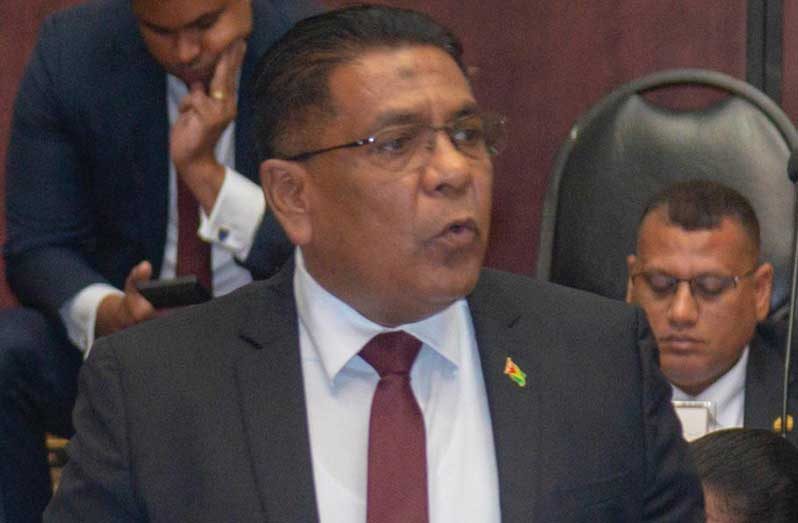—Minister Mustapha links revenue shortfalls in both agencies to El Niño and other issues
THE government is actively working to revive the sugar industry, which has historically played a vital role in the country’s economy, evident from its plans to rejuvenate the sector.
The position was reiterated by Minister of Agriculture, Zulfikar Mustapha, during Friday’s National Assembly session, as he defended the sum of $4.5B in contingency fund advances for Guyana Sugar Corporation (GuySuCo), and the Guyana Rice Development Board (GRDB), for the period April 1 to July 30, 2024. Both agencies fall under the Ministry of Agriculture.
The National Assembly has green-lighted the contingency fund advances.
The minister provided an explanation that GuySuCo experienced a substantial deficit in its revenue, necessitating a $4 billion contingency fund from the government for the state-owned entity.
The funds were urgently needed to cover wages, salaries, pension and other critical operational expenses, Minister Mustapha told the National Assembly.
He explained that the El Niño conditions had caused a “serious problem” with sugar production, leading to a decrease in the first crop’s output this year.
“We had to do a lot of mechanisations; we had to do a lot of replanting; we had to do a lot of operations in the field to get proper irrigation,” he explained.
The agriculture minister added: “The shortfall in revenue caused us to use money to pay wages and salaries. Wages and salaries were 76 per cent of the $4B, pension was seven per cent, fuel was 10 per cent, contracted payment was five per cent, material cost was three per cent…”
During his address, he emphasised the government’s strategic goal to revitalise the sugar industry, generate employment, and improve the lives of thousands of Guyanese.
Minister Mustapha then reminded that the reopening of the sugar estates was in line with the People’s Progressive Party/Civic (PPP/C) government’s manifesto promises.
He alluded to the multiple sugar estates that were closed during the coalition government of A Partnership for National Unity + Alliance for Change (APNU+AFC).
The closures, which happened between 2016 and 2018, were a part of a larger plan to reduce the industry’s scale as a result of financial difficulties.
But there was a lot of opposition to this move from the public, especially from the communities and those who had relied on these estates for their own existence.
“Over 8,000 workers now are working back in GuySuCo. Y’all [APNU+AFC] dismissed 7,000. We brought back over 4,000 workers back in the industry,” Mustapha told Opposition Member of Parliament (MP) Annette Ferguson. “There is no shortage of sugar and there will be no shortage,” Mustapha vehemently retorted to inquiries from Opposition MPs regarding the availability of this commodity.
Asked by Opposition Member of Parliament, Vinceroy Jordan, to give a timeframe for the reopening of the estates at Enmore on the East Coast of Demerara, Skeldon in Berbice and Wales on the West Bank of Demerara, Minister Mustapha said that “Those are a work in progress that will be done in phases.”
“If I was a member of the Opposition, I would be ashamed to come and ask a question like that because they closed down the estates. We reopen Rose Hall estate [at Berbice] and we employ 2,000 persons there. We are now going back to Skeldon to replant with 5,000 hectares. We said we’ll provide jobs for these workers that they [APNU+AFC] dismissed, and we are doing that. We already employ 4,000 of those workers that were dismissed by the APNU+AFC and we will continue to make job opportunities for these people,” said Mustapha, as he outlined the significant progress being made.
GRDB
Minister Mustapha justified the remaining $524 million in operational costs for the GRDB by stating that there were multiple problems with rice planting this year.
He made references to problems like El Niño’s consequences, paddy insect infestations, and the necessity of irrigation projects that cost millions of dollars.
“Paddy bugs were [just] one issue; we had another issue to do with irrigation. We had to put systems in place and get the canals cleaned in certain areas,” he said.
The minister gave assurances that, in contrast to the APNU+AFC, the government would not abandon rice farmers and would instead continue to assist them



.jpg)









